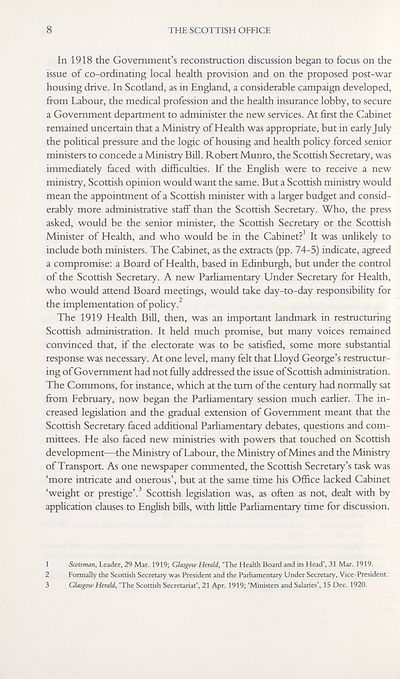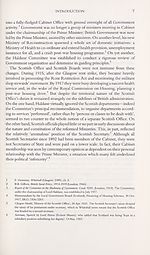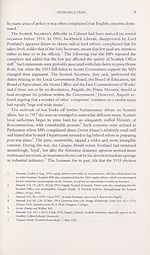Series 5 > Scottish Office
(23) Page 8
Download files
Complete book:
Individual page:
Thumbnail gallery: Grid view | List view

THE SCOTTISH OFFICE
In 1918 the Government’s reconstruction discussion began to focus on the
issue of co-ordinating local health provision and on the proposed post-war
housing drive. In Scotland, as in England, a considerable campaign developed,
from Labour, the medical profession and the health insurance lobby, to secure
a Government department to administer the new services. At first the Cabinet
remained uncertain that a Ministry of Health was appropriate, but in early July
the political pressure and the logic of housing and health policy forced senior
ministers to concede a Ministry Bill. Robert Munro, the Scottish Secretary, was
immediately faced with difficulties. If the English were to receive a new
ministry, Scottish opinion would want the same. But a Scottish ministry would
mean the appointment of a Scottish minister with a larger budget and consid¬
erably more administrative staff than the Scottish Secretary. Who, the press
asked, would be the senior minister, the Scottish Secretary or the Scottish
Minister of Health, and who would be in the Cabinet?1 It was unlikely to
include both ministers. The Cabinet, as the extracts (pp. 74-5) indicate, agreed
a compromise: a Board of Health, based in Edinburgh, but under the control
of the Scottish Secretary. A new Parhamentary Under Secretary for Health,
who would attend Board meetings, would take day-to-day responsibility for
the implementation of policy.2
The 1919 Health Bill, then, was an important landmark in restructuring
Scottish administration. It held much promise, but many voices remained
convinced that, if the electorate was to be satisfied, some more substantial
response was necessary. At one level, many felt that Lloyd George’s restructur¬
ing of Government had not fully addressed the issue of Scottish administration.
The Commons, for instance, which at the turn of the century had normally sat
from February, now began the Parliamentary session much earlier. The in¬
creased legislation and the gradual extension of Government meant that the
Scottish Secretary faced additional Parliamentary debates, questions and com¬
mittees. He also faced new ministries with powers that touched on Scottish
development—the Ministry of Labour, the Ministry ofMines and the Ministry
of Transport. As one newspaper commented, the Scottish Secretary’s task was
‘more intricate and onerous’, but at the same time his Office lacked Cabinet
‘weight or prestige’.3 Scottish legislation was, as often as not, dealt with by
application clauses to English bills, with litde Parliamentary time for discussion.
1 Scotsman, Leader, 29 Mar. 1919; Glasgow Herald, ‘The Health Board and its Head’, 31 Mar. 1919.
2 Formally the Scottish Secretary was President and the Parliamentary Under Secretary, Vice-President.
3 Glasgow Herald, ‘The Scottish Secretariat’, 21 Apr. 1919; ‘Ministers and Salaries’, 15 Dec. 1920.
In 1918 the Government’s reconstruction discussion began to focus on the
issue of co-ordinating local health provision and on the proposed post-war
housing drive. In Scotland, as in England, a considerable campaign developed,
from Labour, the medical profession and the health insurance lobby, to secure
a Government department to administer the new services. At first the Cabinet
remained uncertain that a Ministry of Health was appropriate, but in early July
the political pressure and the logic of housing and health policy forced senior
ministers to concede a Ministry Bill. Robert Munro, the Scottish Secretary, was
immediately faced with difficulties. If the English were to receive a new
ministry, Scottish opinion would want the same. But a Scottish ministry would
mean the appointment of a Scottish minister with a larger budget and consid¬
erably more administrative staff than the Scottish Secretary. Who, the press
asked, would be the senior minister, the Scottish Secretary or the Scottish
Minister of Health, and who would be in the Cabinet?1 It was unlikely to
include both ministers. The Cabinet, as the extracts (pp. 74-5) indicate, agreed
a compromise: a Board of Health, based in Edinburgh, but under the control
of the Scottish Secretary. A new Parhamentary Under Secretary for Health,
who would attend Board meetings, would take day-to-day responsibility for
the implementation of policy.2
The 1919 Health Bill, then, was an important landmark in restructuring
Scottish administration. It held much promise, but many voices remained
convinced that, if the electorate was to be satisfied, some more substantial
response was necessary. At one level, many felt that Lloyd George’s restructur¬
ing of Government had not fully addressed the issue of Scottish administration.
The Commons, for instance, which at the turn of the century had normally sat
from February, now began the Parliamentary session much earlier. The in¬
creased legislation and the gradual extension of Government meant that the
Scottish Secretary faced additional Parliamentary debates, questions and com¬
mittees. He also faced new ministries with powers that touched on Scottish
development—the Ministry of Labour, the Ministry ofMines and the Ministry
of Transport. As one newspaper commented, the Scottish Secretary’s task was
‘more intricate and onerous’, but at the same time his Office lacked Cabinet
‘weight or prestige’.3 Scottish legislation was, as often as not, dealt with by
application clauses to English bills, with litde Parliamentary time for discussion.
1 Scotsman, Leader, 29 Mar. 1919; Glasgow Herald, ‘The Health Board and its Head’, 31 Mar. 1919.
2 Formally the Scottish Secretary was President and the Parliamentary Under Secretary, Vice-President.
3 Glasgow Herald, ‘The Scottish Secretariat’, 21 Apr. 1919; ‘Ministers and Salaries’, 15 Dec. 1920.
Set display mode to:
![]() Universal Viewer |
Universal Viewer | ![]() Mirador |
Large image | Transcription
Mirador |
Large image | Transcription
Images and transcriptions on this page, including medium image downloads, may be used under the Creative Commons Attribution 4.0 International Licence unless otherwise stated. ![]()
| Scottish History Society volumes > Series 5 > Scottish Office > (23) Page 8 |
|---|
| Permanent URL | https://digital.nls.uk/127346277 |
|---|
| Description | Over 180 volumes, published by the Scottish History Society, containing original sources on Scotland's history and people. With a wide range of subjects, the books collectively cover all periods from the 12th to 20th centuries, and reflect changing trends in Scottish history. Sources are accompanied by scholarly interpretation, references and bibliographies. Volumes are usually published annually, and more digitised volumes will be added as they become available. |
|---|


